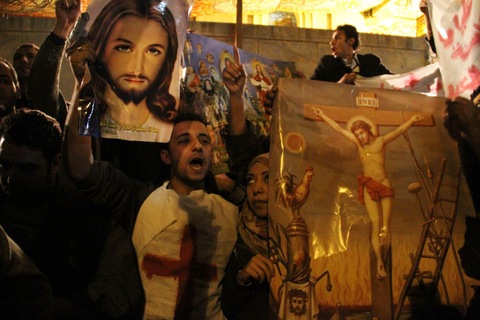Protests erupted Thursday against Minister of Education Moheb El-Rafei pertaining to several recent controversies in the sector.
Teachers and students also demonstrated at the Press Syndicate against the Education Minister and technical schools’ students against the Higher Education Minister, with several demands related to improving the educational system and schools. They also highlighted the controversial case pertaining to student Mariam Malak who was given 0% in her high school final exams.
Further, nearly 30 students rallied in front of Bibliotheca Alexandrina against the Education Minister. According to Revolutionary Socialists (RS), they only stayed for one hour after receiving a phone call from National Security asking them to end their protest for “their safety”.
High degree holders also burnt their PhD and MBA certificates to protest their “uselessness” since they cannot find jobs, demanding their right to be appointed in the government. They protested in front of the Press Syndicate and the Ministers’ Cabinet.
The protests took place one day after police used force against high school students, and assaulted reporters, at a rally against Higher Education El-Sayed Abdel Khalek organised by the students and their parents in front of the ministry downtown Cairo, demanding acceptance into college.
Security forces had confirmed to reporters on the ground that they were “on their way to disperse the protest”. According to RS, security forces assaulted photojournalists and damaged their equipment, injuring three journalists from Al-Tahrir, Al-Watan and Al-Fajr newspapers.
The Al-Tahrir reporter was injured in the eye and taken to the nearby Qasr Al-Eini Hospital. Photos had circulated by activists on social media, showing police assaults on female students.
The controversy which led to the protests started earlier in September, when the Education Minister Abdel Khalek suddenly announced that “the sons of high-profile figures” would be allowed some exceptions with regards to their “geographic preference” in choosing which university to join.
The decision was taken by the Supreme Council for Universities and meant to give additional benefits to the sons of security officers and judges on pretext that their fathers were “on national duty”.
Abdel Khalek’s statements sparked outrage since the majority of Egypt’s students have been struggling to acquire ridiculously high grades in order to be accepted in universities. They could find themselves assigned by the ministry to inconvenient geographical areas due to availability, and they often face difficulties with switching universities.
The minister was forced to reverse the decision after Prime Minister Ibrahim Mehleb advised him to do so through TV statements last Sunday.
Abdel Khalek then backtracked his initial announcement, labelling it as a “misunderstanding”. However, state-run media Al-Ahram had published a copy of the “exceptional” measure allowing a student’s transfer from one governorate to another, quoting an internal ministerial source, and saying that another 40 similar transfers had been allowed.



